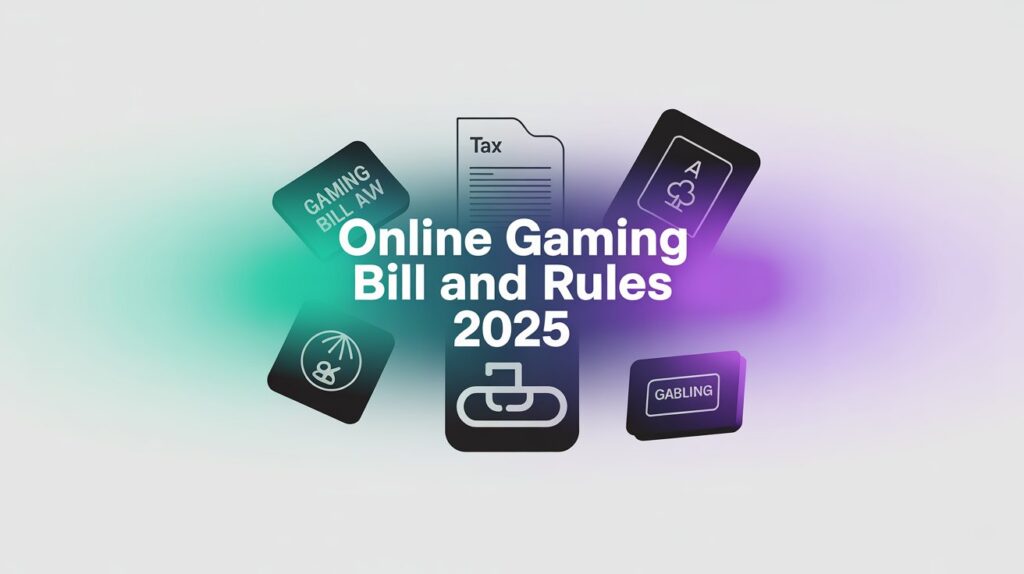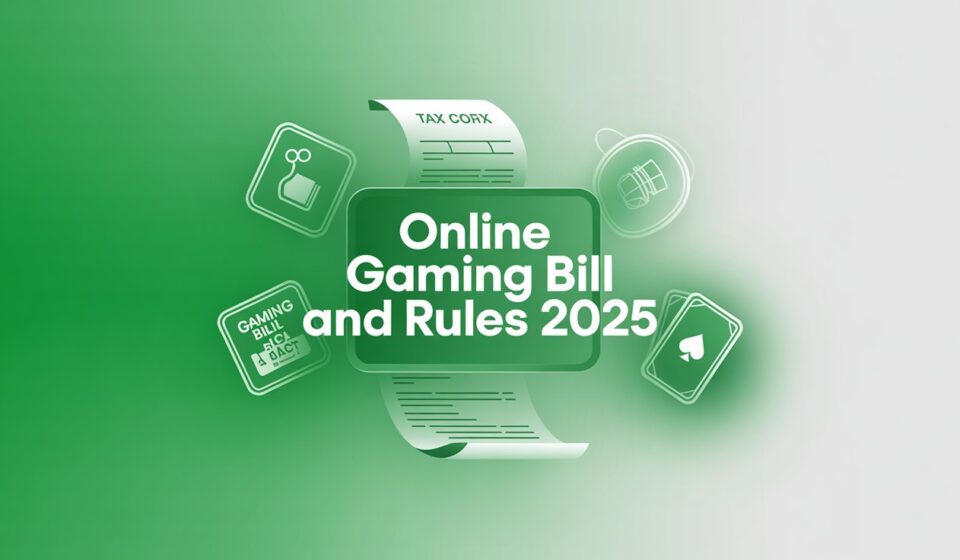Update on online gaming bill: Parliament passed the Promotion and Regulation of Online Gaming Bill 2025. Here is what gamers, startups and tax pros must know.
Table Of Content
- Introduction
- Background: why the update on online gaming bill matters
- Key highlights of the update on online gaming bill
- Impact on players
- Impact on online gaming companies and startups
- Legal and taxation aspects
- Global perspective: how India’s rules compare
- Expert views and industry reaction
- What startups, players and tax advisors should do now
- Conclusion
- Frequently asked questions
- What is the update on online gaming bill?
- Does the Bill ban all online gaming?
- Are player winnings taxable after this Bill?
- What penalties does the Bill propose?
- What is the timeline for enforcement?
Introduction
Update on online gaming bill: Parliament has moved fast on online gaming regulation in 2025. The Promotion and Regulation of Online Gaming Bill 2025 was introduced and quickly passed, setting out a new framework that promotes e-sports and social gaming while banning or restricting games played for money. This article explains what the update on online gaming bill means in practice, who wins and who must change course, and the practical steps players, startups and accountants should take now. We stick to verified sources and avoid speculation.
Background: why the update on online gaming bill matters
India’s online gaming market has grown rapidly over the last decade. The sector includes social games, skill-based contests, fantasy sports, and real-money gaming platforms. Until now, the regulatory landscape was a patchwork of state laws, court rulings and tax notices. The new update on online gaming bill aims to create a central framework to promote safe gaming, curb fraud and prevent financial harm to vulnerable users. The Bill is titled Promotion and Regulation of Online Gaming Bill 2025. Its text is publicly available and lays out the scope, offences and penalties, and a proposal for a regulatory authority for coordinated oversight.

Key highlights of the update on online gaming bill
- Blanket ban on real money gaming: The bill prohibits operation, facilitation or advertising of online games played with money stakes. This covers betting, gambling and many real-money fantasy games.
- Promotion of e-sports and social/educational games: Legitimate e-sports, educational and social gaming are explicitly supported under the Bill. The idea is to distinguish entertainment and skill-based activities from risky money gaming.
- New regulatory body: The Bill proposes an Online Gaming Authority to coordinate policy, licensing and enforcement across platforms and states.
- Penalties and criminal provisions: The Bill includes penalties up to imprisonment and fines (reports cite up to 3 years and fines up to Rs 1 crore for violations), plus powers to block offending apps or platforms.
- Advertising and financial transaction controls: Promotion of banned services and facilitating payments is criminalised; payment players and advertisers are also in scope.
These are the main, confirmed legal elements drawn from the bill text and press coverage. Always consult the official PRS or government PDF for the precise language.
Impact on players
Players who use platforms for leisure, tournaments and e-sports should see minimal disruption. The law explicitly protects e-sports and non-money games.
Casual gamers and players of platforms that offer cash rewards or real-money play may be affected immediately. Prize systems that involve real-money payouts could be reclassified and blocked unless restructured to fit permitted categories or operate outside India. Players should:
- Pause participation in real-money contests until platforms clarify legal compliance.
- Keep records of winnings and transactions if they have tax or legal questions.
- Watch for platform notices and new T&C updates.
Impact on online gaming companies and startups
The update on online gaming bill is seismic for companies that rely on real-money play and wagering models. Early market reaction included sharp share moves for listed gaming firms as investors re-priced risk and revenue expectations. Reuters reported sizeable share declines for some gaming stocks following the Bill’s passage.
Startups and platforms must consider these actions immediately:
- Legal review: Map products to the Bill’s definitions to see which offerings are banned, regulated or permitted.
- Business model pivot: Move toward subscription, advertising, esports, and purely skill/social offerings where possible.
- Compliance & licensing: Prepare to seek registration, licensing or approvals from the proposed Online Gaming Authority if required.
- Payments & refunds: Work with PSPs and banks to pause or reroute transactions that could be non-compliant.
- User communication: Provide clear notices to users about paused services, refunds and alternative products.
VCs and investors will re-evaluate pipelines in the short term. Some companies may explore offshore markets or product segmentation to protect revenue while complying in India.
Legal and taxation aspects
From a legal perspective, the Bill criminalises specific activities and empowers authorities to block platforms and prosecute offenders. It does not directly amend tax law, but enforcement will have tax consequences:
- TDS and reporting: Platforms that previously reported player payouts or deducted TDS may now see changes in reporting rules if prize payouts are curtailed. Ensure tax filings reflect changed operations.
- GST implications: If a platform shifts to subscription or tournament fee models, GST treatment could differ. Consult with tax counsel on GST classification for gaming, entry fees, and prize distributions.
- Seizure and fines: Financial penalties and blocking orders could affect company assets and merchant accounts.
Tax professionals should monitor notifications from the Finance Ministry, Central Board of Indirect Taxes and Customs, and CBIC for any guidance related to taxation and transitional treatment.
Global perspective: how India’s rules compare
Countries vary widely in how they treat online gaming:
- The United Kingdom and Malta regulate and license betting and online gambling with strict consumer safeguards.
- Some US states allow regulated gambling; others ban it at the state level.
- India’s update takes a more prohibitive approach to real-money games, focusing on public health, fraud prevention and financial integrity.
The Indian move is notable for the broad sweep and for combining promotion of e-sports with a hard line on money gaming. International companies will watch closely for enforcement precedents.
Expert views and industry reaction
Industry responses are mixed. Esports and game-developer groups welcomed the clarity for e-sports and educational games. At the same time, industry bodies warned about job and revenue losses in the immediate term, and legal experts highlighted potential constitutional and jurisdictional challenges if states have differing laws.
A Reuters analysis noted immediate market impacts and suggested investment may seek clearer regulatory certainty before committing large capital. Financial analysts cited in press coverage modelled multiple fiscal and revenue scenarios under the new rules.

What startups, players and tax advisors should do now
- Startups: Conduct a compliance gap analysis, pause ambiguous revenue streams, and engage with legal counsel. Update investor decks with regulatory scenarios.
- Players: Avoid real-money contests until platforms confirm compliance. Keep documentation for any payouts.
- CFOs and accountants: Re-run tax models, check GST treatment for new product lines, and prepare refund or liabilities provisioning.
- Regulators and payment providers: Prepare filters and transaction monitoring to block prohibited flows as ordered.
Conclusion
Update on online gaming bill: This new law marks a major turning point for India’s gaming market. It provides clarity by promoting e-sports and social gaming while taking a firm stance against online money gaming, betting and unscrupulous promotion. Players should pause real-money play until platforms clarify compliance. Startups must pivot models or risk enforcement action. Tax and finance teams must re-evaluate reporting, GST classification and TDS processes. Follow official sources for final rules and transitional guidance.
Frequently asked questions
What is the update on online gaming bill?
The update on online gaming bill refers to the Promotion and Regulation of Online Gaming Bill 2025, which Parliament passed and which bans or restricts online money gaming while promoting e-sports and social/educational games.
Does the Bill ban all online gaming?
No. The Bill distinguishes between money gaming and permitted gaming. E-sports, educational and social games are promoted. However, platforms offering real-money play, betting or gambling face prohibition, penalties and potential blocking.
Are player winnings taxable after this Bill?
Taxability depends on activity and payouts. If payouts continue via permitted tournament models, tax rules (including TDS) may apply. If real-money play is banned, payouts for such activities are likely to cease under the law. Consult a tax advisor.
What penalties does the Bill propose?
Media reports cite penalties including imprisonment up to 3 years and fines up to Rs 1 crore for breaches, plus powers to block or take down offending services. Refer to the bill text for exact provisions.
What is the timeline for enforcement?
The Bill passed Parliament and will require rules, notifications and enforcement orders from the relevant ministries and authorities. Expect immediate enforcement actions for obvious violations, and phased implementation for technical and payment controls. Watch official notifications.
Read More about : Income Tax




